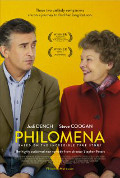
Directed by
Stephen Frears
94 minutes
Rated M
Reviewed by
Sharon Hurst

Philomena
Synopsis: In Ireland in 1952 a young teenager, Philomena Lee (Sophie Kennedy Clark), becomes pregnant and is sent to a convent for “fallen” women. Now elderly, Philomena (Judi Dench) has never given up searching for the son who was forcibly removed from her for adoption. Sacked BBC correspondent Martin Sixsmith (Steve Coogan) stumbles across Philomena’s story and the two team up to track down the lost son.
Inspired by true events, Philomena is based upon Martin Sixsmith’s book,“The Lost Child of Philomena Lee”. Steve Coogan who best known as a comedian, read the story and was inspired to push for making a film out of it. Not only is he the male lead but he has also co-written and co-produced this film. With one of Britain’s top directors, Stephen Frears, at the helm it showcases what British cinema does so winningly - small scale stories of ordinary people.
The film stars a woman who is undoubtedly one of Britain’s best actors ever. Dame Judi Dench deserves every accolade she gets and her portrayal of this multi-faceted woman will have you experiencing many emotions at the same time. Philomena is a bit naïve and gauche in certain areas but on the other hand she is a very down-to-earth, no-nonsense woman. And despite the awful blow life dealt her, she retains an unwavering faith in the Catholic Church, a part of her believing that she has been justifiably punished for her “sin”.
Her antithesis, and in some ways, complement, is the cynical, world-weary Martin, a sworn atheist. Despite being better-educated (or because of this) than Philomena he finds the world a much more difficult place than she does. They are indeed an odd couple and there is a charming quality to the funny and touching contrast between his Oxbridge cynicism and her working class humility. Their heated discussions on life and religion are telling, but even more winning is the way these two characters bond as the plot progresses. The overlay of humour against a background of tragedy works to bring them together.
As with other films with subject-matter spanning so many years, we have the obligatory flashbacks. We see Philomena and the other single mothers working in the convent, the emotional brutality of some of the nuns, and the heartless way in which the children were kept from their mothers, and ultimately removed, often bought by wealthy adoptees in the USA. Frears chooses a cinematic device that for me works wonderfully – he runs many scenes of what look like old super-8 films – and in them we see Philomena’s little boy Anthony in the years after he was adopted and right into his adulthood. We get an overview of his life, just as Philomena and Martin fill in the gaps as they travel together to America in search of confirmation of Anthony’s story. Great surprises await both us and them (not least of which is the speed with which they get answers to their questions!).
So many moments in this film are emotionally wrenching: the young girl’s face as she clings weeping to the convent gates watching her son disappear; Martin’s later discovery that many young girls at the convent died in childbirth their graves now neglected; the seemingly-irreconcilable gulf between religious dogmatists and the vulnerable souls that they brutalized and condemned (made all the more poignant by recent revelations of the sexual offences of the Catholic Church).
Despite showing the shocking inhumanity that well-intentioned people can perpetrate it is to everyone’s credit that the film never veers into mawkishness but finds the right balance between a beautiful compassionate story, thought-provoking issues, sadness and uplifting moments, engaging humour and the irresistible magic of what happens when two people connect in a way that is life-changing for both.
Want something different?





